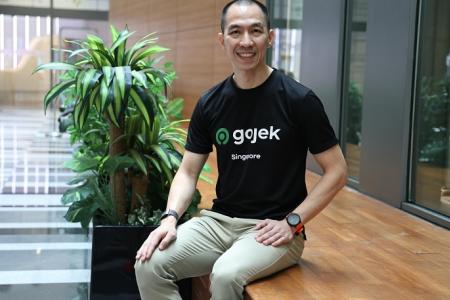Ride-hailing prices may rise due to platform workers law
Hailing a ride in Singapore may become costlier due to a new law strengthening labour protections for platform workers.
But any increase in price for Gojek users due to the Platform Workers Act will not be a sizeable one, said the head of the Indonesian ride-hailing company’s operations here.
“We are still looking at it, but it won’t be something very substantial,” said Gojek Singapore general manager Lien Choong Luen, when asked about the costs that may be passed on to consumers and what form this will take.
“We’re really trying to just make sure that the economics works for us,” he told The Straits Times in an interview on Nov 20 to mark the company’s sixth year of operations in the Republic. Gojek launched its app here in November 2018.
The Platform Workers Act, which was passed by Parliament in September, will cover private-hire car drivers, cabbies and delivery workers who rely on online matching platforms such as Gojek for income.
Under the law, these platform workers will be able to contribute more to their Central Provident Fund (CPF) accounts, with contribution rates that will increase over the next five years so they are eventually aligned to what employees and their employers pay today.
These higher CPF rates will be compulsory for younger platform workers born on or after Jan 1, 1995, and optional for older workers.
The law also makes it mandatory for all platform operators to provide platform workers with work injury compensation insurance with the same level of coverage as employees.
While Mr Lien said he is supportive of the new legislation, complying with the law will increase costs for everyone, he warned. “This is not a high-margin business that we’re in,” he added.
According to a Nov 28 report by Singapore-based consultancy Momentum Works, the CPF contributions that platform operators need to make under the Platform Workers Act could cost the industry an estimated US$368 million (S$494 million) over the next five years.
The premiums for new workplace injury compensation insurance policies could cost the operators another US$32 million a year in total, said the report.
According to Momentum Works’ estimates, if consumers were to bear these added costs, ride-hailing prices would rise 8 per cent, assuming a $20 trip.
On the other hand, if the platform operators were to bear them, the dent to their net revenue per booking could be up to 40 per cent.
With about a month to go until the Act takes effect on Jan 1, 2025, Mr Lien also pointed to challenges in rolling out some of its provisions.
“I don’t have an insurer yet because we got the confirmed list only one or two months ago... The insurers are also having difficulty in pricing premiums accurately,” he said.
Another effect of the new law is that it will add a layer of complexity to Gojek’s tie-up with Singapore taxi giant ComfortDelGro, Mr Lien noted.
Under the tie-up, unfulfilled rides on Gojek’s GoCar private-hire car service have been made available to ComfortDelGro cabbies – a move that has helped boost supply for the ride-hailing firm, Mr Lien said, without providing more details when pressed.
He said both companies are still trying to work through this first phase of the partnership, before thinking about phase two, which will allow Gojek drivers to take on unfulfilled ComfortDelGro Taxi rides.
Noting that the ride-hailing industry in Singapore has matured over the past six years, Mr Lien said partnerships like this are key for Gojek to stay ahead.
On the demand side, Gojek’s tie-up with the yuu Rewards Club loyalty programme has been crucial too.
“If you want to get (market) share or break out of the constraints here, then you have to think of different ways to work,” he said. “Nobody is comfortable saying, ‘I’ll maintain, I’ll sit on what I have.’”
Asked about Gojek’s priorities for 2025, Mr Lien said the firm wants to continue growing. But gone are the days of doing so unsustainably, using huge incentives to draw in drivers and passengers.
One example of organic growth is the company’s new GoCar Flash service that is on trial in central Singapore, covering an area stretching from Bukit Merah to Toa Payoh to Marine Parade.
The idea is to match Gojek users with private-hire car drivers who are closer for faster pick-ups. The catch is that the fares for the new service will be at least 15 per cent higher. This will allow for faster dispatches while helping drivers by making fares more attractive, Mr Lien said.
Mr Lien said there is still a tremendous battle for workers, but Gojek’s driver supply has improved in 2024.
While the firm reviews its driver commission rate periodically, it has no plans to change the current 10 per cent rate, which was reduced from 15 per cent in 2023.
One thing that may change here, however, is Gojek’s goal to make every vehicle on its platform a fully electric one by 2030. Today, more than half of the vehicles on Gojek’s platform in Singapore are either fully electric or hybrid vehicles, up from about 30 per cent in 2021.
Given the higher cost of battery-powered vehicles in the Republic, Mr Lien said the company may need to relook its electrification plan here. “The economics and the performance of hybrids make a lot of sense... They have very good fuel efficiency, great range and a lot more flexibility,” he added.
Asked about fare levels, a common bugbear among passengers and drivers, Mr Lien said they remain affordable even as business costs and the overall cost of living have continued to rise.
“If we are completely out of whack, that’s what all the other competitors are there for, and vice versa. Competition keeps everybody honest on all sides,” he added.
Get The New Paper on your phone with the free TNP app. Download from the Apple App Store or Google Play Store now


